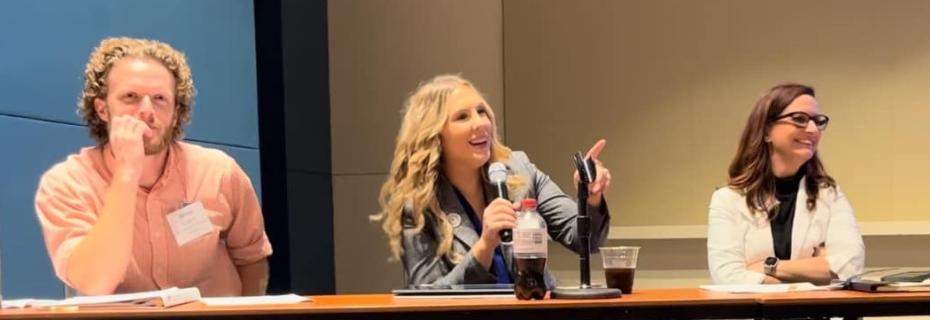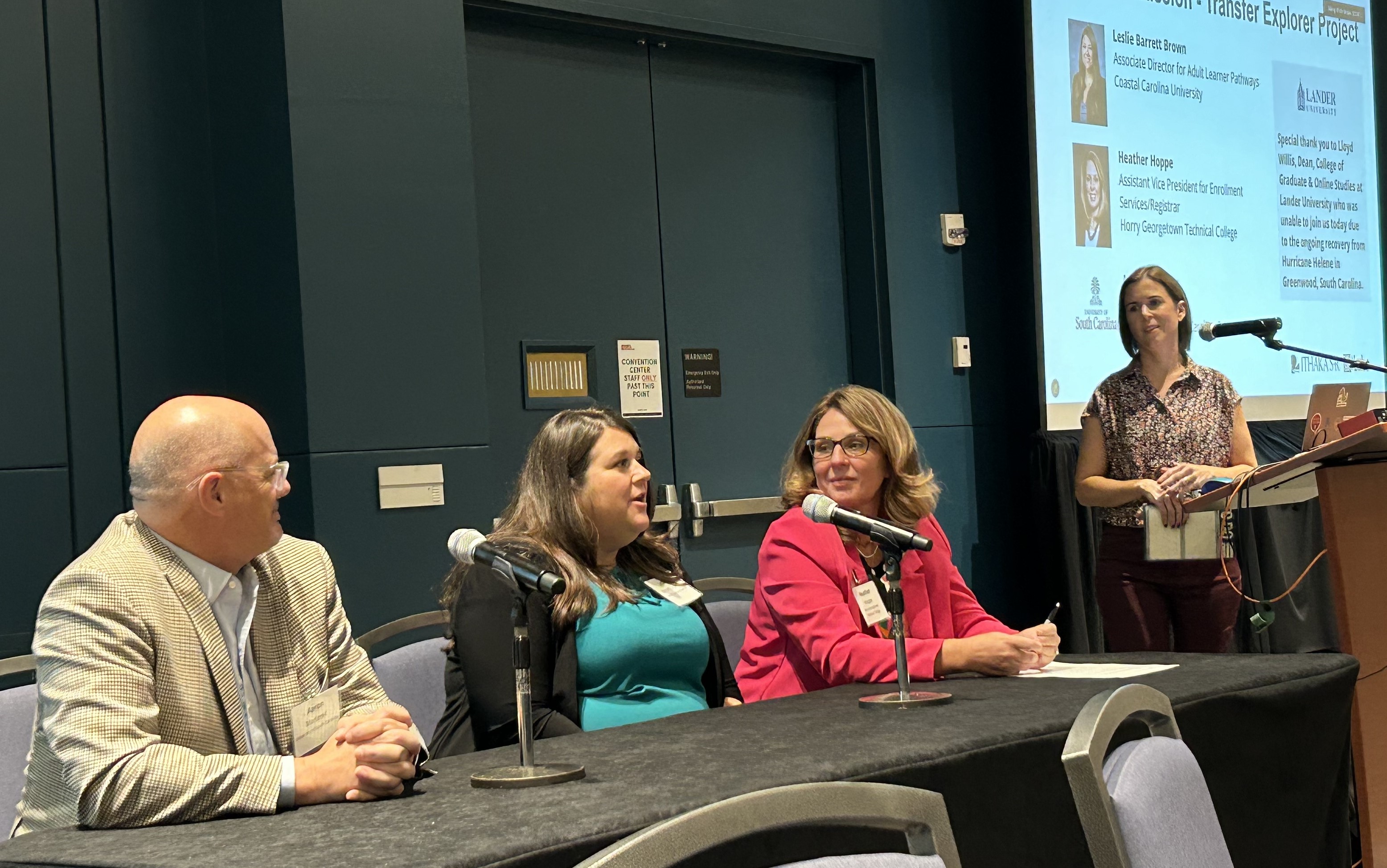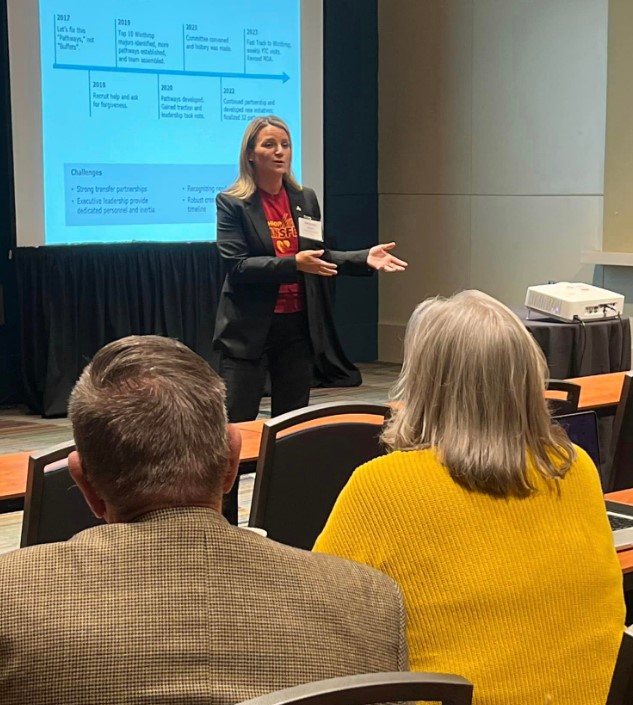
The South Carolina Commission on Higher Education hosted the third South Carolina Transfer Convening in Columbia Oct. 3, with a strong emphasis on building collaboration and innovation between all colleges and universities across the state to improve transfer student success.
The event, titled “Facing the Future Together: Emphasizing the Power of Collaboration,” provided an opportunity for more than 100 transfer professionals and higher education leaders from both public and independent institutions to share ideas and learn about the innovative processes in transfer being used across the state.
Dr. Jeff Perez, president and executive director of the CHE, emphasized the need for collaboration to improve educational outcomes and also help address the economic needs of the state by growing a skilled workforce of graduates.
“We need to connect with one another. As you all know, you can have processes, but it's the personal relationships that are important, especially with transfer, to solve the problems,” Perez said during his opening remarks. He challenged attendees to “collaborate and work together to address any challenges that you face and then communicate to share with each other your successes. Share with each other your strategies. That's why we're here today.”
New transfer platform unveiled
South Carolina is one of three states participating in the Universal Transfer Explorer pilot program with national non-profit Ithaka S + R. The pilot was developed to simplify the process for students navigating transfer options.
Emily Tichenor, senior program manager from Ithaka S + R, spoke about South Carolina’s selection for the program and provided a platform demonstration. During the demonstration, Tichenor selected several courses from different participating institutions: the platform instantly showed how credits would apply to a specific degree program at a third institution.
Currently participating South Carolina institutions are:
- Aiken Technical College
- Coastal Carolina University
- College of Charleston
- Denmark Technical College
- Horry-Georgetown Technical College
- Lander University
- The University of South Carolina system
Tichenor also emphasized the high level of collaboration that transfer success work requires.
“None of this is something that can be solved by a single institution or a single department or a single office,” she said.

Meta majors and guided pathways in action
Dr. Amanda James, associate vice president for enrollment and dean of admissions at Winthrop University, and John McGill, assistant vice president of academic pathways at York Technical College, led a breakout session on their highly effective Winthrop Bridge partnership. The program refines transfer from York Technical College to Winthrop, allowing students to complete the first two years and receive an associate degree at York Tech, then transfer on to Winthrop to complete their bachelor’s degrees.
To make this program successful, the two institutions have collaborated to design meta-majors- a grouping of related fields of study designed to simplify the process of selecting a major. The schools have also developed guided pathways which include required coursework at both institutions and lay out key milestones for students so that they can easily track progress towards earning their degrees.
While at York Tech, bridge students receive a Winthrop ID card and parking pass, allowing them to be a part of the Winthrop student experience, including cultural events, the library, and the academic success and writing centers.
James said that building the bridge program required assistance from many people in both institutions who were deeply committed to student success.
“It was truly finding people that believed in what we wanted to do, and who were tired of seeing transfer students come in in tears when credits weren’t transferring over,” James said. “It was truly getting people who felt the frustration, the sadness, the despair of students.”
She also noted the importance of considering dual enrollment students when developing the pathways and emphasized the importance of institutions across higher education working to develop similar programs.
“We're here to help at the end of the day. We're in this because we want students to be successful. If we can help other institutions get pathways like this developed let us know,” James said, emphasizing that successful partnerships really come down to “finding the right person on the other side of the other institution that's going to be as excited about this as you are.”

Sessions show value of collaboration
Morning keynote speaker Dana Yow, executive director of the South Carolina Education Oversite Committee, provided the audience a deeper understanding into the K-12 system, to include college and career readiness.
In other sessions, experts and stakeholders tackled issues ranging from faculty support in optimizing transfer student success to innovative transfer data processes.
Representatives from Trident Technical College and the University of South Carolina shared success stories and strategies for faculty engagement in ensuring seamless credit transfers between institutions, and also highlighted USC’s recent integration of professional advisors to support student success.
CHE Senior Researcher Mariana Manic spoke on the SC Transfer Outcomes Dashboard, which was launched earlier this year. The dashboard provides critical data to better understand transfer student outcomes across the state. This dashboard represents a significant step forward in tracking transfer patterns, identifying challenges, and providing evidence that can be used in research to improve success rates for transfer students.
Dr. Corey Gheesling, CHE workforce development manager, led a breakout session exploring the relationship between workforce demands and transfer student success. He highlighted how enhancing transfer pathways can drive socio-economic mobility for students while addressing workforce gaps across the state.
Dr. J. Lee Brown, dean of the college of graduate and continuing studies at Coastal Carolina University, offered further insights into the history and role of transfer in the broader landscape of higher education. During his afternoon keynote presentation, he also offered several action steps for the continued improvement of transfer including:
- Facilitating productive conversations between faculty at two-year and four-year institutions to address issues of rigor, equivalency, and transferability.
- Developing smart academic pathways to allow students to complete their degrees in the most efficient and affordable way possible.
- Assessing and auditing articulation agreements to ensure they are working for both students and institutions.
- Developing enrollment and performance targets for transfer student success, as what gets measured gets managed.
- Reorient orientation programs to better support the unique needs of transfer students.
The “Transfer Data Unpacked: Stakeholders, Limitations, and Future Needs,” panel discussion focused on transfer data collection and workflow processes at two-year and four-year institutions. Panelists shared thoughts on how to better use transfer data to support transfer student success and provide insight into transfer data collection, stakeholder engagement and process improvement.
Panelists in the “Relationships = Partnerships” had an opportunity to discuss past, present, and future wins, challenges, and hurdles with respect to transfer partnerships, and showcase how technical colleges and senior institutions are tearing down student barriers and replacing them with highways to success.
Moving forward
The CHE plans to use the insights and feedback from this year’s attendees to drive future improvements to South Carolina’s transfer systems. In a closing statement, Dr. Kristin Brooks, CHE college completion manager, noted that the future of transfer success in South Carolina hinges on partnerships and relationships formed.
“If we don't have those two things, it just doesn't work. So please keep those collaborations strong,” Brooks said.
The CHE plans to continue hosting these convenings on an annual basis. For more information about transfer related initiatives, visit the Transfer Excellence Center on the CHE website.
